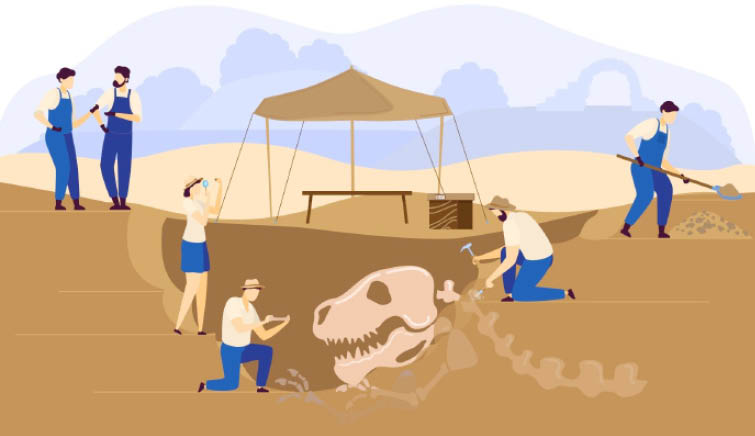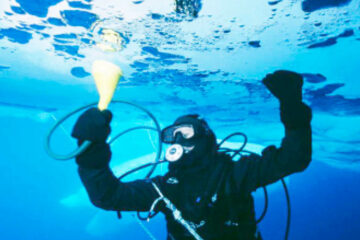What palaeontologists do
Palaeontologists are geoscientists (or earth scientists) who specialize in studying the history of life on Earth through the fossil record. Their job involves searching for fossils, collecting samples, taking them back to a laboratory, and then cleaning, studying, and storing fossils.
They can work for a wide range of employers, including museums, colleges and universities, gas and mining companies, and government agencies. Some even serve as consultants for TV and movie productions.
Essential skills and qualities
- Analytical thinking skills: Beyond finding and excavating fossils, the job of a palaeontologist involves a lot of research, particularly in terms of analysing fossils and examining and interpreting data.
- Problem-solving skills: A career in palaeontology requires solving complex problems, such as figuring out how to extract fossils from the ground and troubleshooting preservation techniques.
- Physical stamina: Fieldwork can be physically demanding, as it often requires hiking to remote locations while carrying heavy testing and sampling equipment.
- Outdoor skills: Palaeontologists spend a lot of time in the great outdoors when conducting fieldwork, which often involves camping. Geocaching skills may also prove useful.
- Communication skills: A large part of the job involves interacting with people, such as supervising other palaeontologists on excavations, giving talks, and educating the public. Good writing skills are also necessary for authoring research papers.
- Patience: It can take months sometimes even years to find any new fossils, as remains are often destroyed or consumed soon after death. As such, a lot of patience and perseverance will go a long way.
Steps to become a palaeontologist.
Determine if it’s the right job for you.
First things first, make sure that becoming a palaeontologist is really what you want to do. After all, you don’t want to waste the time, effort and resources necessary to pursue a career in palaeontology, only to discover later on that your interests lie elsewhere.
Take the time to figure out your values, strengths and personality type and how they all fit the requirements and demands of the job. Ask yourself if you’re really willing to commit to 6 or more years of studies, and whether you can see yourself digging up bones, conducting experiments in labs and writing reports day in and day out.
Complete a bachelor’s degree program.
After college, you’ll need to pursue a postsecondary education. This begins with a bachelor’s degree. Ideally, a BSc in palaeontology should be your first option, but such programs are rare, so be sure to research what’s available, including abroad.
Alternatively, any major science specialization will do, such as biology, geology, geography, zoology, botany, environmental studies or a related field that said, a double major in biology and geology will be particularly useful (or at least majoring in one and minoring in the other).
Always check what classes are offered in the program you’re considering. Programs that include coursework in subjects like vertebrate and invertebrate palaeontology, evolutionary biology, genetics, stratigraphy, mineralogy, ecology, and sedimentary petrology should be at the top of your list!
Earn a doctoral degree.
Your academic journey doesn’t end with a bachelor’s degree. In fact, employers generally only consider applicants with a postgraduate qualification. You’ll need at least a master’s degree, but most careers in palaeontology (particularly in research and academia) require a PhD degree in geological sciences with a focus on palaeontology.
Get some hands-on experience.
Beyond the right qualifications, employers also want candidates who know what they’re doing through some proven practical training, which you can gain by attending excavations. Most university programs include several weeks of fieldwork at local or international fossil sites, but it’s also a good idea to do some volunteering at excavations.
Not only does hands-on experience help you develop the skills and knowledge needed for a career in palaeontology, but it also looks great on your CV, as employers will be more inclined to consider your candidacy.
Equally important, meanwhile, is to attend as many industry seminars and conferences as you can, while joining a professional association (like the Paleontological Society and the Paleontological Research Institution) will provide you with networking opportunities, and access to exclusive workshops, lectures and journals.







